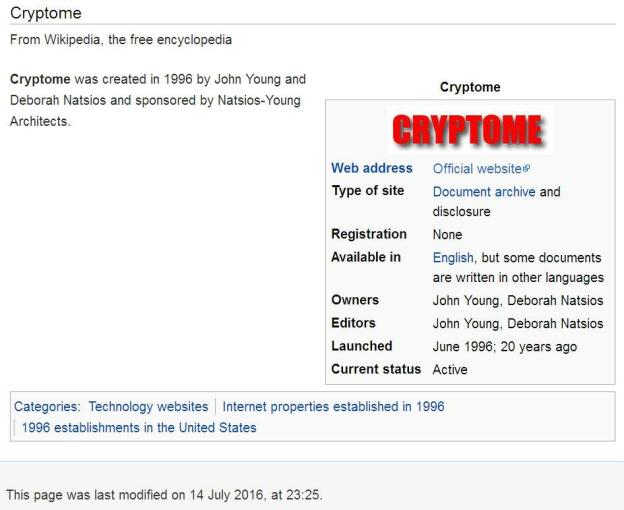Cryptome unfamiliar to the general public, is well-known in circles where intelligence tactics, government secrets and whistle-blowing are primary concerns. Since its creation in 1996, Cryptome has amassed more than 70,000 files — including lists of secret agents, high-resolution photos of nuclear power plants, and much more.
Its co-founder and webmaster, a feisty 77-year-old architect, doesn’t hesitate when asked why. “I’m a fierce opponent of government secrets of all kinds,” says John Young. “The scale is tipped so far the other way that I’m willing to stick my neck out and say there should be none.” Young describes several exchanges with federal agents over postings related to espionage and potential security breaches, though no charges have ever been filed. And he notes that corporate complaints of alleged copyright violations and efforts to shut Cryptome down have gone nowhere.
For Young, there’s a more persistent annoyance than these: the inevitable comparisons of Cryptome to WikiLeaks, the more famous online secret-sharing organization launched by Julian Assange and others in 2006. Young briefly collaborated with WikiLeaks’ creators but says he was dropped from their network after questioning plans for multimillion-dollar fundraising. Cryptome operates on a minimal budget — less than $2,000 a year, according to Young, who also shuns WikiLeaks-style publicity campaigns. “We like the scholarly approach — slow, almost boring,” says Young. He likens Cryptome to a “dusty, dimly lit library.” That’s not quite the image that Reader’s Digest evoked in 2005, in an article titled “Let’s Shut Them Down.” Author Michael Crowley assailed Cryptome as an “invitation to terrorists,” notably because of its postings on potential security vulnerabilities.Cryptome’s admirers also don’t fully buy into Young’s minimalist self-description….
Young considers himself a freedom-of-information militant, saying he is unbothered by “the stigma of seeming to go too far.” Claims that Cryptome aids terrorists or endangers intelligence agents are “hokum,” he said. “We couldn’t possibly publish information to aid terrorists that they couldn’t get on their own,” he said, depicting his postings about security gaps as civic-minded. “If you know a weakness, expose it, don’t hide it,” he said…
As a motto of sorts, the Cryptome home page offers a quote from psychiatrist Carl Jung: “The maintenance of secrets acts like a psychic poison which alienates the possessor from the community.” The website says Cryptome welcomes classified and confidential documents from governments worldwide, “in particular material on freedom of expression, privacy, cryptology, dual-use technologies, national security, intelligence, and secret governance.” Young attributes Cryptome’s longevity and stature to its legion of contributors, most of them anonymous, who provide a steady stream of material to post. Among the most frequently downloaded of Cryptome’s recent postings were high-resolution photos of the Fukushima Dai-ichi nuclear plant in Japan after it was badly damaged in the March 2011 tsunami/earthquake disaster.
Cryptome also was a pivotal outlet last year for amorous emails between national security expert Brett McGurk and Wall Street Journal reporter Gina Chon, which led McGurk to withdraw as the Obama administration’s nominee to be ambassador to Iraq. Other documents on the site list names of people purported to be CIA sources, officers of Britain’s MI6 spy agency, and spies with Japan’s Public Security Investigation Agency….
Another exchange with the FBI came in November 2003, according to Young, when two agents paid him a visit to discuss recent Cryptome postings intended to expose national security gaps. The postings included maps and photos of rail tunnels and gas lines leading toward New York’s Madison Square Garden, where the Republican National Convention was to be held the next year….Another confrontation occurred in 2010, when Cryptome posted Microsoft’s confidential Global Criminal Compliance Handbook, outlining its policies for conducting online surveillance on behalf of law enforcement agencies. Contending that the posting was a copyright violation, Microsoft asked that Cryptome be shut down by its host, Network Solutions. Criticism of Microsoft followed, from advocates of online free speech, and the complaint was withdrawn within a few days….
Moreover, Young urges Cryptome’s patrons to be skeptical of anything placed on the site, given that the motives of the contributors may not be known. “Cryptome, aspiring to be a free public library, accepts that libraries are chock full of contaminated material, hoaxes, forgeries, propaganda,” Young has written on the site. “Astute readers, seeking relief from manufactured and branded information, will pick and choose…”
Excerpts from DAVID CRARY, Older, Quieter Than WikiLeaks, Cryptome Perseveres, Associated Press, Mar. 9, 2013
